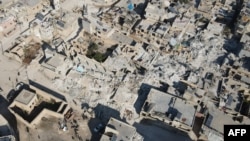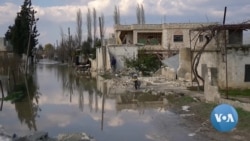Rescuers in Turkey pulled several more people alive from the rubble Tuesday, nearly 200 hours after a series of powerful earthquakes struck the region but experts warned the window is closing for finding more people alive.
In neighboring Syria, more aid is starting to flow to war- and now earthquake-scared civilians in the country’s northwest, following President Bashar al-Assad’s agreement with the United Nations on Monday to allow humanitarian workers to use two additional crossing points from Turkey into opposition-held areas to speed deliveries.
U.N. Secretary-General Antonio Guterres told reporters Tuesday that an 11-truck convoy “is on the move” to cross through the newly reopened Bab al-Salam border crossing from Turkey, “with many more [convoys] to come.”
Guterres’ humanitarian chief negotiated the use of two border crossings from Turkey into northwest Syria, meeting with President Assad on Monday in Damascus, bringing to three the number the U.N. has to work with. It is the first time since the conflict began in 2011 that Assad has agreed to allow aid to cross from Turkey to rebel-held areas.
The U.N. chief also announced an appeal for $397 million in the next three months for the earthquake response in Syria, adding that a similar appeal is being drawn up for Turkey.
“We all know that lifesaving aid has not been getting in at the speed and scale needed,” Guterres said of opposition-held areas of Syria. “The scale of this disaster is one of the worst in recent memory.”
He emphasized that aid “must get through from all sides, to all sides, through all routes — without any restrictions.”
The U.N. humanitarian office said Monday the death toll in Syria has surpassed 4,300, with another 7,600 injured.
In Turkey, authorities have reported at least 31,643 deaths from the earthquake centered in the Gaziantep region.
The latest rescues included one from a crumbled building in Adiyaman province and two others from a destroyed building in central Kahramanmaras, near the epicenter.
Turkish residents in Samandag in Hatay province, complained the government has not done enough in the search for survivors.
One earthquake survivor told VOA’s Turkish service that everything is being done through volunteers and community efforts, not by the government.
“We rescued a lady and her baby from under the rubble. Alive. With our own efforts. With our own sledgehammers, with our hammers. I had many friends with me. This is not acceptable,” the survivor said.
Another said, “Volunteers are working here, day and night, nonstop. They don’t even eat. They don’t even come down to drink water. AFAD [Turkey’s Disaster Management Authority] came to save us supposedly. The team came here to work on detecting. They just came and left. They said, ‘There was nothing here,’ and turned back and left.”
Turkish television broadcast scenes of the rescues, but experts warned the window is closing for finding more people alive in what remains of collapsed buildings after so much time.
The VOA Turkish Service contributed to this report, which includes some information from The Associated Press and Reuters.








